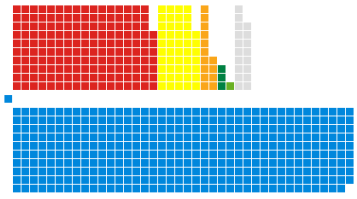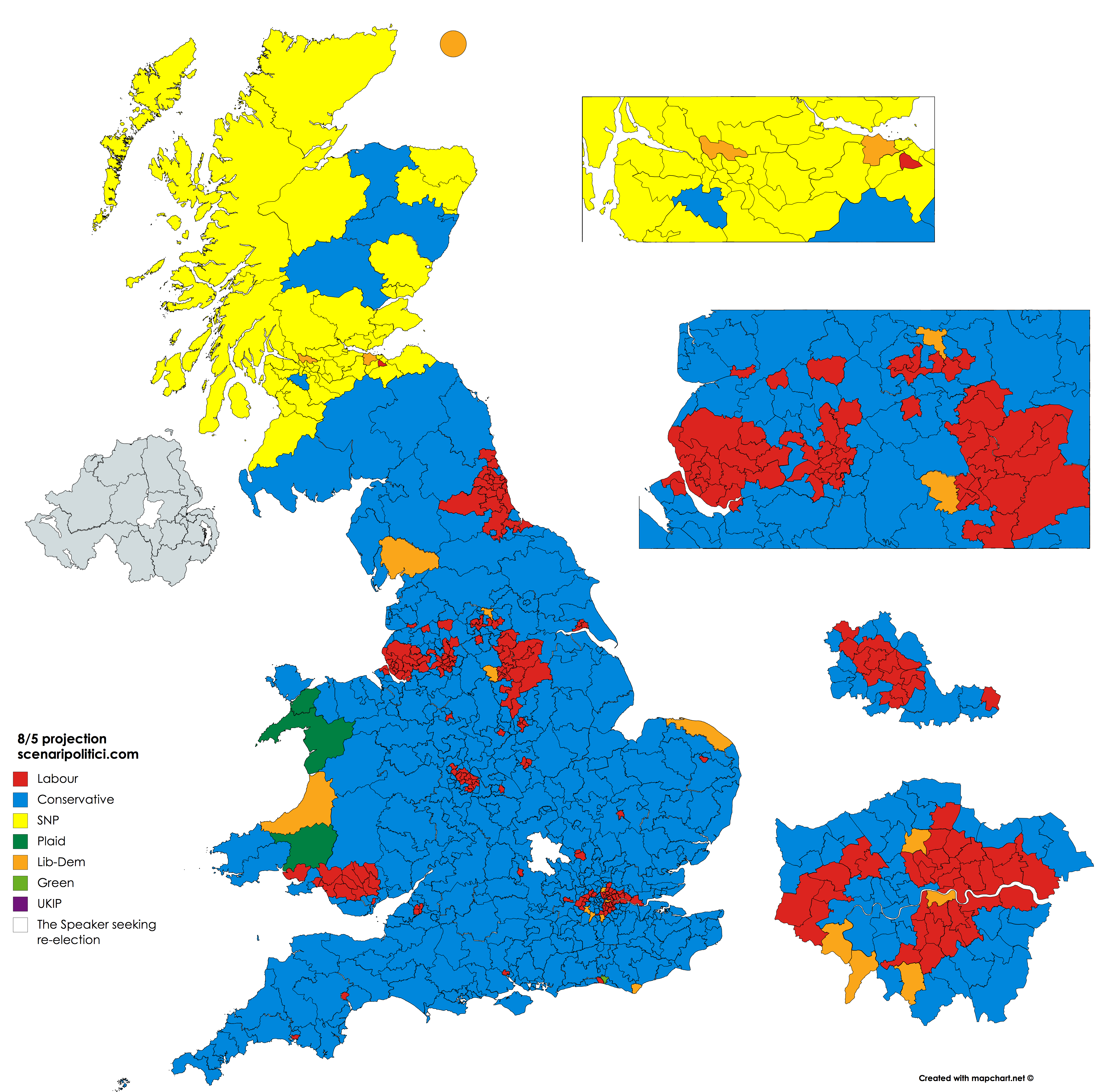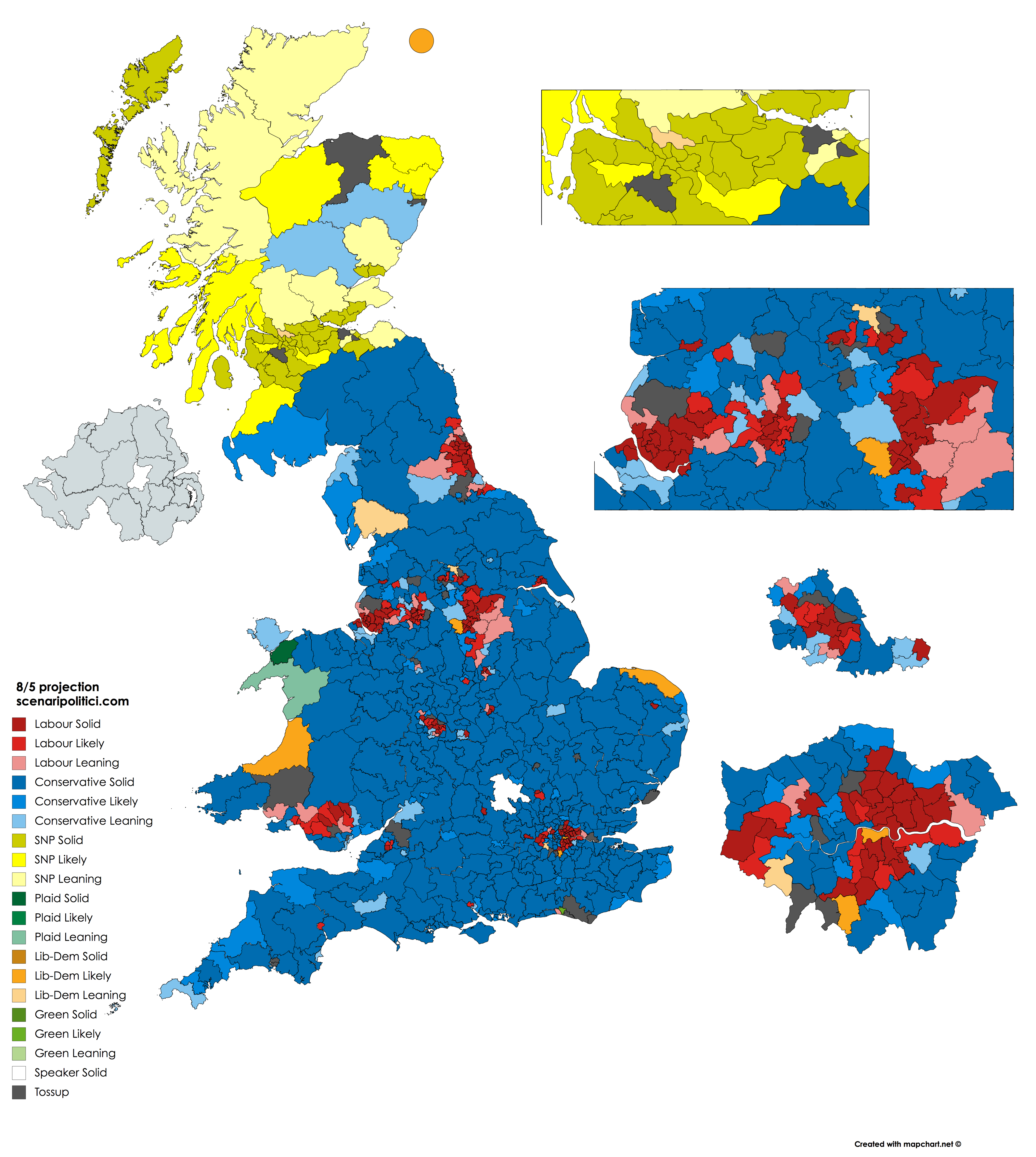This is our third projection for the United Kingdom general elections, which will take place on the 8th of June. The methodology we follow is described in detail in this post.
Let’s start with the seat projection. The numbers in brackets show the difference with our previous projection.

Conservative Party: 400 seats (-14), of which 296 solid (-20), 50 likely (+7), 39 leaning (-1) and 15 tossup (+8)
Labour Party: 167 seats (+14), of which 88 solid (+8), 43 likely (+1), 23 leaning (-1) and 13 tossup (+6)
SNP: 47 seats (-1), of which 31 solid (=), 7 likely (+1), 9 leaning (+2) and 0 tossup (-4)
Lib-dem: 14 seats (+1), of which 6 likely (=), 4 leaning (-2) and 4 tossup (+3)
Plaid: 3 seats (=), of which 1 solid (=), 1 leaning (-1) and 1 tossup (+1)
Green Party: 1 seat, likely (=)
UKIP: 0 seats (=)
Let’s now analyse these data more in depth.
- The Conservative Party appears to remain in a strong position, although somewhat weaker than it was in our previous projection. According to current opinion polls, the Conservatives should gain 65 seats from Labour, 7 from the SNP, 1 seat from the Lib-Dems and 1 from UKIP, while losing 3 seats to the Lib-Dems and 2 to the Labour. The main difference from our previous projection is in the Midlands, where an average 4% swing to Labour has significantly reduced their gains in that region. Of the 5 seats they are projected to lose, 2 are in London (both to the Lib-Dems) and 3 in Southern England (1 to the Lib-Dems and 2 to Labour), although they are all but one classified as tossups. They are still projected to become the biggest party in Wales and the 2nd biggest party in Scotland, both outstanding achievements for a party that used to be very weak outside England.
- The Labour Party appears to have improved its position from our previous projection, although it would still be its worst post-war performance in term of seats. We currently project they would gain 2 seats from the Conservatives in Southern England (although the margins are extremely small), compared to the 0 gains in our previous projection. They should also keep their only Scottish seat, once again by an extremely small margin. Their losses are still projected to be substantial, with 65 seats lost to the Conservatives, and 2 seats lost to the Lib-Dems. Another positive aspect of this projection is that they are increasing the number of safe and likely seats.
- The SNP is in a very similar position to our previous projection. They should lose 7 seats to the Conservatives and 2 to the Lib-Dems (up one from last week). On the bright side, all the seats we currently project the SNP to win are at least in the leaning territory, with no tossups.
- The position of the Lib-Dems has not significantly changed. Once again their best area should be London, with significantly smaller gains in terms of votes and seats in the rest of the country. In England they should still gain 3 seats from the Conservatives (from 3 to 2 in London and from 0 to 1 more in Southern England) and 2 from Labour (both in London), while losing 1 seat to the Conservatives in Northern England. They are also projected to gain 2 seats from the SNP in Scotland.
- Once again we project Plaid Cymru and the Green Party to confirm all their seats without new gains. One of the seats currently held by Plaid Cymru has moved to the tossup column, with the Conservatives very close to gain it.
- UKIP is once again projected to lose many of its votes and the only seat they won in 2015.
In summary, projecting the average of the opinion polls would lead to a landslide Conservative victory, although it would be of a smaller scale than in our previous projection. If the abstentionist Irish Nationalist party Sinn Fein were to confirm its 4 seats, their working majority would be of 154 seats. If the Conservatives were to win only the seats we project either as safe or likely, they would achieve a sizable working majority of 46 seats.
A final comment: our first three projections have only considered Great Britain, since Northern Ireland has a different party system and is generally not polled for general elections. One poll has been released thus far, but projecting it before the candidates have been selected in each constituency could be misleading, since occasionally parties do not run candidates in every constituency to avoid splitting the partisan (unionist or nationalist) vote. The list of candidates will be confirmed on Thursday the 11th of May, hence in our next projection we will probably attempt to assign the Northern Irish constituencies.





